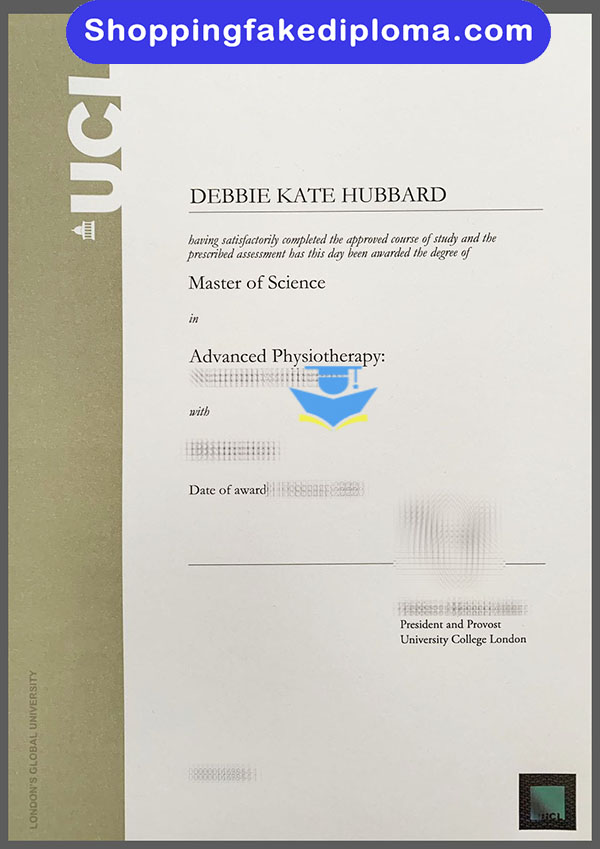University College London Fake Degree: What you need to know

University College of London fake degree
This is University College of London fake degree, University College of London (UCL) is one of the most famous and oldest public research universities in the UK and a member of the federal University of London. Located in the heart of the UK capital, London, it has world-class teaching staff, facilities and reputation. It offers a variety of undergraduate and postgraduate courses covering humanities, social sciences, engineering, medicine and other fields. If you want to apply for a University College of London degree, here’s what you need to know:
1. How to choose a major
UCL has more than 600 master’s programs in a variety of disciplines and fields. You can find the major you are interested in on UCL’s official website and read the relevant information carefully, including entry requirements, course structure, fees, etc. You can also learn more about UCL’s professional evaluations and rankings through search engines or consulting agencies.
When choosing a major, you need to consider the following factors:
– Your interests and goals: You should choose a major that matches your interests and career goals so that you can maintain motivation and enthusiasm during your studies and be prepared for future development.
– Your background and abilities: You should choose a major that suits your background and abilities so that you can meet UCL’s entry requirements and achieve good results on your course. If you do not have relevant undergraduate background or language scores, you may need to take some preparatory or language courses first.
– Your budget and time: You should choose a major that fits your budget and time schedule so that you can afford UCL tuition fees and living expenses and complete the course within the stipulated time. If you have financial difficulties or time constraints, you can apply for some scholarships or choose some flexible course models.
2. How to apply for a major
Masters courses at UCL usually start in September each year, but different programs have different application deadlines. You need to fill out the application form online and upload relevant materials, such as University College of London transcripts, language scores, personal statements, letters of recommendation, etc. You will also need to pay an application fee of £80 and wait for the outcome of the review by UCL.
During the application process, you need to pay attention to the following points:
– Prepare in advance: You should start preparing your application materials as early as possible and submit your application before the deadline. This way you can avoid some surprises or delays and have more time to revise and improve your application.
– Highlight your strengths: In your personal statement you should highlight your interests and motivations in your subject and UCL, and demonstrate that you have the required knowledge, skills and experience. You should also ask your recommenders to provide you with some specific and positive comments and testimonials in your letters of recommendation.
– Prepare for the interview: You may be invited to attend an interview or submit other supplementary materials, depending on the program you are applying for and UCL requirements. You should prepare some possible questions and answers in advance and remain confident and polite.
3. How to learn a major
UCL’s master’s programs usually last one year and include two terms of teaching and one term of a thesis or project. You need to take some compulsory and elective courses and evaluate your learning through examinations or assignments. You will also need to complete a related research topic with the help of your instructor and write a high-quality paper or report.
During the learning process, you need to pay attention to the following points:
– Make a plan: You should make a reasonable and effective study plan based on your professional requirements and personal circumstances, and execute it according to the plan. This way you can balance your time and energy and avoid procrastination and stress.
– Make use of resources: You should make full use of the various resources and services provided by UCL, such as libraries, laboratories, lectures, seminars, tutorials, societies, etc. In this way you can expand your knowledge and horizons, and improve your abilities and literacy.
– Communication and cooperation: You should actively communicate and cooperate with your teachers, classmates, mentors, etc., such as asking questions, discussing, sharing, asking for help, etc. This way you can get more feedback and support and build better relationships and networks.
4. How to graduate major
Masters courses at UCL usually end in September of the second year, but different majors have different graduation requirements. You need to complete all courses and meet certain achievement standards to receive a UCL Master’s degree certificate. You also need to participate in some graduation-related activities, such as graduation ceremonies, graduation photos, graduation parties, etc.
During the graduation process, you need to pay attention to the following points:
– Confirmation of information: You should promptly confirm and update your personal information and contact information, and follow UCL’s official notices and guidelines. This way you can ensure you receive and collect your degree certificate and attend relevant events.
– Celebrate achievements: You should be proud and happy of your experience and achievements at UCL and share and celebrate them with your family, friends, teachers etc. This way you can express your gratitude and joy and make wonderful memories.
– Plan for the future: You should plan your future path after graduation from UCL based on your interests and goals, such as continuing your studies, finding a job, starting a business, etc. You should also keep in touch with UCL and make use of UCL’s alumni network and resources to help you achieve your dreams.